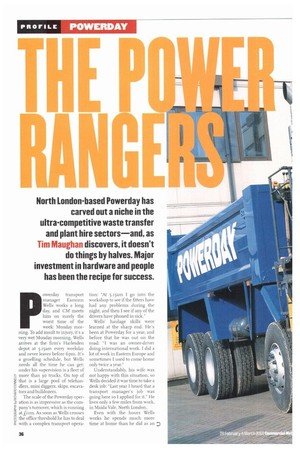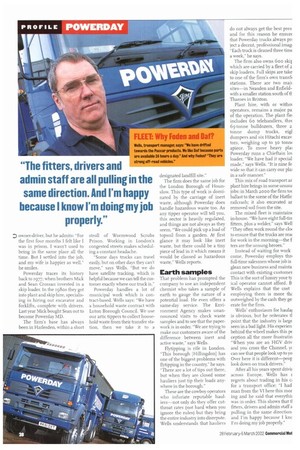North London-based Powerday has carved out a niche in the
Page 36

Page 38

If you've noticed an error in this article please click here to report it so we can fix it.
ultra-competitive waste transfer and plant hire sectors—and, as Tim Maughan discovers, it doesn't do things by halves. Major investment in hardware and people has been the recipe for success.
p()wet day transport manager Eamonn Wells works a long day, and CM meets him on surely the worst time of the week: Monday morning. To add insult to injury, it's a very wet Monday morning. Wells arrives at the firm's Harlesden depot at 5.15am every weekday and never leaves before 6pm. It's a gruelling schedule, but Wells needs all the time he can get: under his supervision is a fleet of Lmore than 30 trucks. On top of
± that is a large pool of telehan E dlers, mini diggers, skips, excava tors and bulldozers. 4
:The scale of the Powerday opercc .E' ation is as impressive as the corn="pany's turnover, which is running 3 at film. As soon as Wells crosses g the office threshold he has to deal I with a complex transport opera
tion: "At 5.i5arn I go into the workshop to see if the fitters have had any problems during the night, and then I see if any of the drivers have phoned in sick."
Wells' haulage skills were learned at the sharp end. He's been at Powerday for a year, and before that he was out on the road: "I was an owner-driver doing international work. I did a lot of work in Eastern Europe and sometimes I used to come home only twice a year."
Understandably, his wife was not happy with this situation, so Wells decided it was time to take a desk job: "Last year I heard that a transport manager's job was going here so I applied for it." He Lives only a few miles from work, in Maids Vale, North London.
Even with the hours Wells works he spends much more time at home than he did as an:)
D owner-driver, but he admits: "For the first four months I felt like I was in prison. I wasn't used to being in the same place all the time. But I settled into the job, and my wife is happier as well," he smiles.
Powerday traces its history back to 1977, when brothers Mick arid Sean Crossan invested in a skip loader. In the 198os they got into plant and skip hire, specialising in hiring out excavator and forklifts, complete with drivers. Last year Mick bought Sean out to become Powerday MD.
The firm's base has always been in Harlesden, within a short stroll of Wormwood Scrubs Prison. Working in London's congested streets makes scheduling a constant headache.
"Some days trucks can travel easily, but on other days they can't move," says Wells. "But we do have satellite tracking, which is helpful because we can tell the customer exactly where our truck is."
Powerday handles a lot of municipal work which is contract-based. Wells says: "We have a household waste contract with Luton Borough Council. We use our artic tippers to collect household waste from their transfer station, then we take it to a The firm does the same job for the London Borough of Hounslow. This type of work is dominated by the carriage of inert waste, although Powerday does handle hazardous waste too. As any tipper operator will tell you, this sector is heavily regulated, and things are not always as they seem. "We could pick up a load of topsoil from a garden. At first glance it may look like inert waste, but there could be a tiny piece of lead in it which means it would be classed as hazardous waste." Wells reports.
Earth samples
That problem has prompted the company to use an independent chemist who takes a sample of earth to gauge the nature of a potential load. He even offers a same-day service. The Environment Agency makes unannounced visits to check waste samples and to see that the paperwork is in order. "We are trying to make our customers aware of the difference between inert and active waste," says Wells.
Flytipping is rife in London. "This borough [Hillingdon] has one of the biggest problems with flytipping in the country," he says. "There are a lot of tips out there, but when they are closed some hauliers just tip their loads anywhere in the borough."
These are the cowboy operators who infuriate reputable hauliers—not only do they offer cutthroat rates (not hard when you ignore the rules) but they bring the entire industry into disrepute. Wells understands that hauliers do not always get the best pres and for this reason he ensure that Powerday trucks always pri
ject a decent, professional imag, "Each truck is cleaned three time a week," he says.
The firm also owns Goo skir which are carried by a fleet of 2
skip loaders. Full skips are take to one of the firm's own transfi stations. There are two maje sites—in Neasden and Enfieldwith a smaller station south of tE Thames in Brixton.
Plant hire, with or withol operators, remains a major pa of the operation. The plant fle, includes Go telehandlers, thre 65-tonne bulldozers, three 2 tonne dump trucks, eigi dumpers and six Hitachi excav tors, weighing up to 30 tonm apiece. To move heavy plai Powerday runs a Chieftain Icn loader. "We have had it special made," says Wells. "It is nine fe wide so that it can carry our plai in a safe manner."
This mix of road transport ar plant hire brings in some unusu jobs: in March 2000 the firm to ballast to the scene of the Hatfie railcrash; it also excavated ar removed soil from the site.
The mixed fleet is maintain( in-house. "We have eight full-fin fitters, plus a welder," says Well "They often work round the doc to ensure that the trucks are reat for work in the morning—the f ters are the unsung heroes."
Instead of waiting for work come, Powerday employs thr■ full-time salesmen whose job is glean new business and mainta contact with existing customei This is the sort of luxury your ty ical operator cannot afford. B. Wells explains that the cost employing them is more thz outweighed by the cash they ge erate for the firm.
Wells' enthusiasm for haulai is obvious, but he reiterates ti point that the industry is large seen in a bad light. His experien behind the wheel makes this pe ception all the more frustratin "When you are an HGV driv and you cross the Channel, ye can see that people look up to yo Over here it is different—peop look down on truck drivers."
After all his years spent drivit across Europe, Wells has regrets about trading in his c; for a transport office: 'I had man from the VI here this mor ing and he said that everythit was in order. This shows that ti fitters, drivers and admin staff a pulling in the same directionand l'm happy because I knc I'm doing my job properly."












































































































































